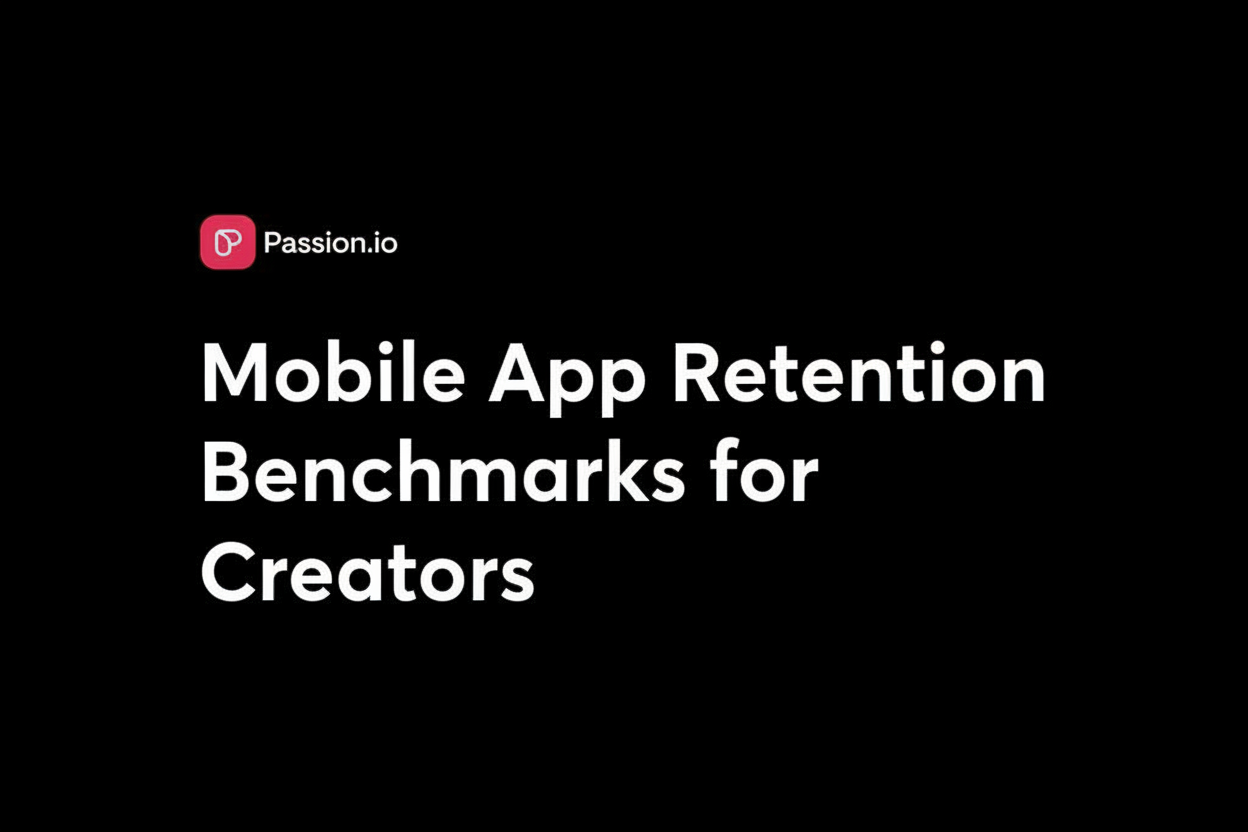Updated October 17, 2025
If you run courses or coaching, you do not need more tools. You need higher completion rates and more members who come back every week. A branded app on iOS, Android, and web gives you push notifications, in-app community, and structured challenges in one place so you can own your audience and grow subscriptions. Passion.io provides those capabilities with a no-code builder and training creators point to as a difference maker through the app builder features.
Quick snapshot of what others say:
"Passion makes building your own e-learning app fast, simple, and stress-free." - Rob M.'s G2 review
"The platform is easy to use with clear directions on what to do next." - Michele D. P.'s G2 review
"The building app education is clear, step by step, pedagogical guidance in a nudging way with a humorous touch - love it!" - Åsa Lindstedt's Trustpilot review
For real-world examples and a quick walkthrough of creator apps, watch the below video which shares 3 examples:
Understanding mobile app retention: key definitions
- Retention rate is the percent of a cohort who return on a specific day after install such as Day 1, Day 7, or Day 30, as defined in AppsFlyer's retention report.
- Churn rate is the percent of users who stop using the app in a period. Many teams treat uninstall or long inactivity as churn, per AppsFlyer's engagement and retention guide.
- DAU/MAU stickiness is daily active users divided by monthly active users. Around 20% is good and above 25% is strong, as outlined in AppsFlyer's stickiness explainer.
- Cohort analysis groups users by install date or key action to see where engagement drops or improves.
General mobile app retention benchmarks (Day 1, 7, 30)
Across consumer apps, retention falls fast after install. Business of Apps' mobile app retention guide reports Day 1 around 25 percent, Day 7 around 11–13 percent, and Day 30 around 6 percent.
The exact numbers vary by store, region, and category. On platform splits, Business of Apps’ app retention rates show Android Day 1 near 21 percent and Day 30 near 2 percent, with iOS Day 1 near 24 percent and Day 30 near 3–4 percent.
Education and course app retention: what recent data shows
Education is one of the hardest categories for retention.
- Education Day 1 often sits near 14–15 percent on both platforms.
- Education Day 30 is typically 2–3 percent, with some studies listing 2.1 percent as a category average, as noted in AppsFlyer's retention rate entry.
The goal is not to accept low engagement. The goal is to design nudges, community, and short sprints that fit busy adult learners.
Mobile app vs. mobile web: where engagement actually happens
Most mobile time happens inside apps, not browsers. Comscore’s findings show app time dominates mobile time share, while mobile web remains critical for discovery, as summarized in the 2017 US mobile app report by Digital Marketing Community. That tilt toward apps is why push notifications, deep links, and native communities lift return visits compared with email-only reminders to a website.
Comparison: retention benchmarks mobile vs web
Key factors influencing retention in course and coaching apps
- Onboarding to a first win: A 10–15 minute first session that achieves a specific goal tends to lift Day 1 and Day 7, as described in AppsFlyer's engagement and retention guide.
- Push notifications that respect context: Personalized, time-zone aware messages with deep links improve return rates. Test relevance, timing, and frequency caps with holdouts, per Airship's push strategy for retention.
- In-app community: Social accountability and quick feedback increase stickiness in learning contexts, which aligns with AppsFlyer's engagement and retention guide.
- Challenges and gamification: Time-boxed sprints, streaks, and leaderboards help learners maintain momentum in Weeks 1–4, as covered in AppsFlyer's stickiness explainer.
- Short, structured content: Microlearning and drip schedules fight the forgetting curve and fit busy schedules. You can build these with Passion.io's interactive exercises.
- Performance and stability: Quality fixes and crash-free sessions correlate with lower churn.
For a quick primer on retention levers, watch AppsFlyer's short video on YouTube.
What counts as a good retention rate for your app
Directional goals for education:
- Day 1 above about 15 percent is competitive.
- Day 7 in the low teens is healthy.
- Day 30 above about 3 percent outperforms category norms.
- DAU/MAU near 20 percent shows stickiness and above 25 percent is strong, based on AppsFlyer's retention rate and stickiness guidance.
Beat your baseline: Track cohorts to verify improvements after you add a weekly challenge, community prompts, and a consistent push cadence.
Actionable strategies to boost your course app retention
1. Design a 15-minute first session
- Do one win now. For example, a 3 minute intro, a goal tap, a community check-in, then schedule the next lesson.
- For setup ideas, use this step-by-step guide to course structure.
- Measure time to first value and the lift in Day 1 and Day 7 by cohort.
2. Run a 30 day challenge with push
- Send 2–3 nudges per week with deep links to today’s task. Add streaks, progress bars, and a weekly leaderboard.
- Expect more Week 2 and Week 4 activity when combined with community prompts, supported by AppsFlyer's stickiness explainer.
- For a launch playbook, watch Passion.io’s App Secrets session.
3. Build community into every lesson
- End each module with a discussion prompt and a weekly wins thread. Assign accountability buddies in paid tiers.
- Track posts per member, replies per prompt, and their correlation with Day 30. Learn more about community tools on Passion.io Communities.
4. Adopt microlearning and drip
- Publish 5–8 minute lessons, 3 times per week. Use spaced review for knowledge topics.
- Track completion per lesson and Day 30 by cohort. You can deliver this format with interactive exercises.
5. Tune push in 3 steps
- Ask permission with a clear benefit during onboarding.
- Personalize by goal, behavior, and time zone.
- Cap frequency and always deep link to an action. See Airship's push strategy for retention.
6. Ship weekly quality wins
Remove friction in onboarding and playback. Watch crash-free sessions, time to first content, and support tickets.
Features checklist for course apps that help with retention
- Onboarding to first win
- Push notifications with personalized reminders and new content alerts
- In-app community channels and weekly wins threads
- Challenges and gamification such as streaks, badges, and leaderboards
- Microlearning and drip with offline downloads and checklists
- Subscriptions with monthly and annual options
- Analytics for cohorts, DAU/MAU, completion, and push delivery
You can build these with Passion.io’s in-app community, interactive courses, push notifications, and offline content, then iterate with cohort data.
What to do in 30 days
Outcome: Web app live in weeks. App Store submissions underway.
Steps:
- Upload 10 core micro-lessons
- Turn on community
- Schedule a 30 day challenge
- Set a twice-weekly push cadence with deep links
Fees: Apple 99 dollars per year. Google Play 25 dollars one-time. PassionPayments platform fee 3.9 percent plus Stripe. IAP 15–30 percent. Enroll through the Apple developer program.
Plan: Start on Launch or Scale. Plus and higher plan pages outline App Store listing support on the Plus offer.
Risk: Submission delays.
Mitigation: Open developer accounts in Week 1 and follow the Help Center submission checklist.
Get started with Passion today with a 30-day money back guarantee.
Frequently asked questions
What are average Day 1, Day 7, Day 30 retention rates for education apps?
Education apps commonly see around 14–15 percent on Day 1 and 2–3 percent on Day 30, with some studies listing 2.1 percent at Day 30 for the category, as noted by AppsFlyer’s retention rate guidance.
How do education app numbers compare to all apps?
All apps average about 25 percent Day 1, 11–13 percent Day 7, and roughly 6 percent Day 30, based on Business of Apps' retention guide.
Why do apps retain better than mobile web?
Most mobile time is spent in apps, and apps add push, deep links, offline mode, and native community, which drive return visits beyond email-only reminders, as seen in Comscore’s findings summarized by Digital Marketing Community.
What is a good Day 30 for a course app?
Above about 3 percent is strong for education. Track cohorts and aim to beat your own baseline monthly using AppsFlyer's retention report.
Which tactics move the needle fastest?
A time-boxed challenge, in-app community prompts, and 2–3 personalized pushes per week typically improve Week 2 and Week 4 activity. Personalized messaging and relevant in-app prompts improve stickiness, as covered in AppsFlyer's stickiness explainer.
What fees should I expect when I add payments?
PassionPayments web checkout has a 3.9 percent platform fee plus Stripe. In-app purchases carry 15–30 percent. Apple is 99 dollars per year and Google Play is 25 dollars one-time. See Passion.io FAQs and the Apple developer program.
Where can I see real creator reviews?
Recent G2 and Trustpilot reviews highlight ease and guidance. For example: "Passion makes building your own e-learning app fast, simple, and stress-free" in Rob M.'s G2 review, and "The platform is easy to use with clear directions on what to do next" in Michele D. P.'s G2 review. You can also browse more on G2.
Any short videos to watch before I start?
For retention, see AppsFlyer’s quick primer on YouTube. For launching an app, Passion.io’s App Secrets session is designed for creators and coaches.














